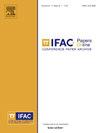Data-Driven Modelling and Predictive Control for the Geometry and Mechanical Properties of Freeform Bending Processes⁎
Q3 Engineering
引用次数: 0
Abstract
Freeform bending is a technique used to bend different tube profiles into complex structures. In the realm of Aritificial Intelligence and Machine Learning, data-driven approaches in modeling and in optimization based control contribute to the job being executed, by increasing product quality and reducing energy consumption and material waste.
In previous works, soft-sensors as well as different factors affecting the geometry and the residual stresses have been investigated and been utilized in a preliminary closed-loop control structure. Later on, this control structure has been replaced with a control strategy called Residual Strategy Algorithm, that could, based on previous deviations in the geometry, proactively react in order to reduce their effects. In this paper, the previously developed Residual Strategy Algorithm is extended to include both, the geometry as well as the residual stresses of the tube being bent. Also the modelling of both will be discussed altogether. The validation of the algorithm is done using simulation results.
针对自由形态弯曲过程的几何形状和机械性能的数据驱动建模和预测控制⁎
自由弯曲是一种将不同的管型弯曲成复杂结构的技术。在人工智能和机器学习领域,通过提高产品质量、减少能耗和材料浪费,数据驱动的建模和优化控制方法有助于工作的执行。在以前的工作中,研究了软传感器以及影响几何形状和残余应力的不同因素,并将其用于初步的闭环控制结构。后来,这种控制结构被一种称为残余策略算法的控制策略所取代,该策略可以基于先前几何中的偏差,主动做出反应以减少其影响。在本文中,扩展了先前开发的残余策略算法,使其既包括弯曲管的几何形状,也包括弯曲管的残余应力。同时,还将对两者的建模进行讨论。仿真结果验证了算法的有效性。
本文章由计算机程序翻译,如有差异,请以英文原文为准。
求助全文
约1分钟内获得全文
求助全文
来源期刊

IFAC-PapersOnLine
Engineering-Control and Systems Engineering
CiteScore
1.70
自引率
0.00%
发文量
1122
期刊介绍:
All papers from IFAC meetings are published, in partnership with Elsevier, the IFAC Publisher, in theIFAC-PapersOnLine proceedings series hosted at the ScienceDirect web service. This series includes papers previously published in the IFAC website.The main features of the IFAC-PapersOnLine series are: -Online archive including papers from IFAC Symposia, Congresses, Conferences, and most Workshops. -All papers accepted at the meeting are published in PDF format - searchable and citable. -All papers published on the web site can be cited using the IFAC PapersOnLine ISSN and the individual paper DOI (Digital Object Identifier). The site is Open Access in nature - no charge is made to individuals for reading or downloading. Copyright of all papers belongs to IFAC and must be referenced if derivative journal papers are produced from the conference papers. All papers published in IFAC-PapersOnLine have undergone a peer review selection process according to the IFAC rules.
 求助内容:
求助内容: 应助结果提醒方式:
应助结果提醒方式:


